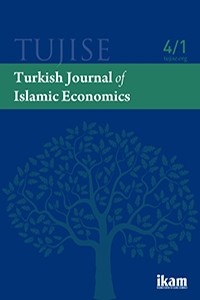BEYTÜLMAL VE ONUN İKTİSADİ GELİŞMEDEKİ ROLÜ: MODERN BİR ÇALIŞMA
İslam Devletinin kamu hazinesi olarak bilinen Beytülmal, Hz. Peygamber (sav) tarafından oluşturulmuştur ve Hz. Peygamber (sav)’den hemen sonra gelen İslam Devletinin iki halifesi Hz. Ebubekir (ra) ve Hz. Ömer (ra) tarafından da genişletilmiştir. Beytülmal devlet fonlarının toplandığı ve kullanıldığı kamu hazinesidir. Bu makale çağdaş yaklaşımla Beytülmal’ın iktisadi gelişmede oynağı potansiyel rolü ve katkısını incelemeyi amaçlamaktadır. Kalitatif bir makale olacaktır, analitik ve betimleyici method uygulanacaktır. Bu makale, güçlü bir iktisadi büyüme için İslam Finansının hızlı gelişmesiyle birlikte Beytülmal’den istifade edilebileceği sonucuna varmaktadır.
Anahtar Kelimeler:
Beytülmal, Fon Yönetimi, İktisadi Gelişme, Dağıtım ve Yeniden
BAYT AL-MAL AND ITS ROLE IN ECONOMIC DEVELOPMENT: A CONTEMPORARY STUDY
Bayt al-Mal, known as the public treasury of Islamic state, was established by the Prophet-may peace be upon Him- and then it was further extended and expanded by Abu Bakr and Umar, who succeeded the Prophet as the Caliph of the Islamic state. It is the state treasury that keeps the sole authority to mobilize the funds of the state. This paper aims to study the potential role and contribution of Bayt al-Mal to economic development in the contemporary context. It will be a qualitative paper and the analytical and descriptive method will be applied. Historically Bayt al-Mal played a great role in the distribution and redistribution of funds. It performed the function that is similar to the function of the ministry of finance at present. It also carried out the jobs of central bank in terms of monitoring, issuing currencies, controlling credits and so forth. Through discussing its sources and expenditures the paper posits that the role of Bayt al-Mal can be revived and accelerated by, for example, providing small-medium funds, managing Zakah and awqaf, channeling the funds, issuing various financial instruments and so forth. Bayt al-Mal could have a significant role in the eradication of poverty from the state. The paper concludes that with the rapid growth of Islamic finance, the Bayt al-Mal can be utilized in parallel in order to have a robust economic development.
Keywords:
Bayt al-Mal, Funds Management, Economic Development, Distribution and,
___
- Abu Yusuf, (1979), Kitab al-Kharaj, Beirut: Dar al-Ma'rifah.
- Balatunusi, Taqi al-Din Abu Bakr, (1989), Tahrir al-Maqal fima Yahillu wa Yahrimu min Bayt al-Mal, ed. Fath Allah Muhammad, Egypt, al-Mansurah: Dar al-Wafa.
- Farra, Abu Ya'la Muhammad, (1973), al-Ahkam al-Sultaniyyah, Indonesia: Surabaya, 3rd edn.
- Islamic Financial Institutions and Markets, (2011), Kuala Lumpur: INCEIF, the Global University in Islamic Finance.
- Karimah, Ibn Sadah, (2014), al-Iradat al-Ammah al-Islamiyyah wa dawruha fi Tahqiq al-Tanmiyyah al-Ijtima'iyyah, Jil Research Center. Retrieved on 14/12/2014 at http://jilrc.com
- Khalili, Ahmad ibn Hamd, (2004), al-Fatawa…Bayt al-Mal, Muscat: al-Ajyal li al-Taswiq.
- Lahsasna, Ahcene, (2013), Maqasid al-Shari'ah in Islamic Finance, Kuala Lumpur: IBFIM.
- Manjarah, Abdur Rahman, (1993), al-Fath al-Mubin fi Bayan al-Zakat wa Bayt Mal al-Muslimin, ed. Muhammad al-Habib al-Tajkani, Rabat: Dar al-Afaq al-Jadidah.
- Mawardi, Abul Hasan, (1989), al-Ahkam al-Sultaniyyah wa al-Wilayat al-Diniyyah, Kuwait: Dar Ibn Qutaybah.
- Ministry of Awqaf and Religious Affairs, (1986), al-Mawsu'ah al-Fiqhiyyah, Kuwait, vol. 8, 2nd edn.
- Possumah, Bayu Taufiq & Ismail, Abdul Ghafar, (2012), Baitul Mal and Legal Constraint: Public Wealth Management in Malaysian Context, International Journal of Academic Research in Business and Social Sciences, vol.2, no.11.
- Readings in Public Finance in Islam, (1995), IRTI, IDB.
- Robbani, Mohammed, 2010, Bayt al-Mal: Proposed Launch & Operational Framework, UK: The Institute of Islamic Finance.
- Salam, Abu Ubayd al-Qasim, (1989), Kitab al-Amwal (the Book of Finance), Beirut: Dar al-Shuruq.
- Tawdi, Muhammad, (2000), Kashf al-Hal anil Ujuh allati Yantazimu minha Bayt al-Mal, ed. Abdul Majid al-Khiyali, Beirut: Dar al-Kutub al-Ilmiyyah.
- Zalloom, Abdul Qadeem, 1988, Funds in the Khilafah State, London: al-Khilafah Publications, 2nd edn.
- Başlangıç: 2014
- Yayıncı: Research Center for Islamic Economics (ikam)
